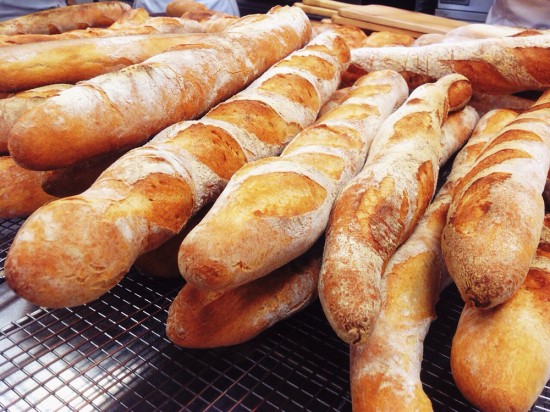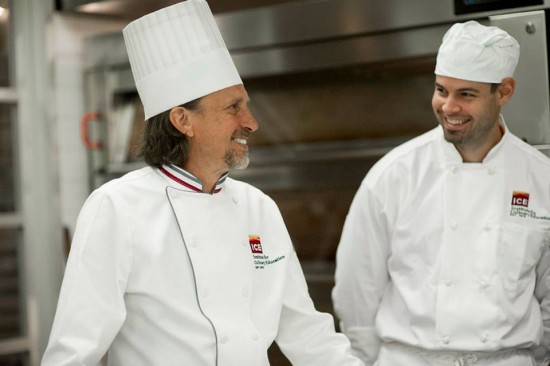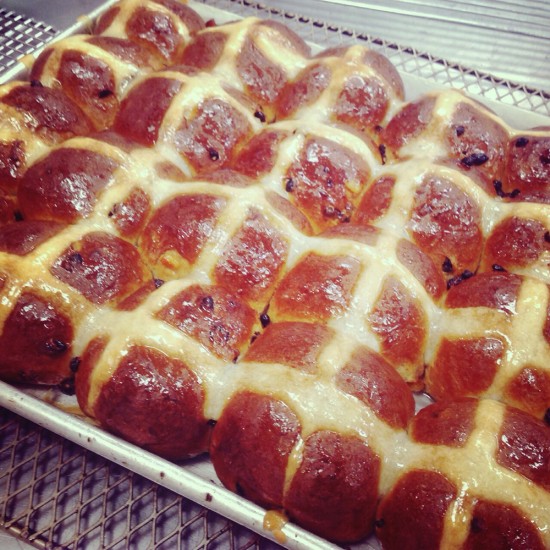While my first module as an ICE pastry student contained mostly lectures and cooking demonstrations, my second module ("Mod 2" as we students refer to it) was much faster paced and hands-on. Our mission? Bread baking—which requires some seriously vigorous work. It’s all about speed, efficiency and the ability to produce mass quantities of bread without sacrificing quality.
It's been about a week and a half since we have started this mod and although it's been hectic, it’s been tons of fun. Sure, there’s a lot more to do than normal and it’s a little more tense in the kitchen, but in the long run, we are enjoying our time baking bread and watching our amazing creations come to life.

So there are a few general terms and processes that every aspiring bread baker should know: rising, fermentation, proofing, gluten and turning. Rising refers to the process of letting the kneaded dough rest, untouched, in a bowl with plastic wrap sealed over top. Fermentation is the process where yeast, dry or fresh, produces carbon dioxide in the dough. This makes the dough "rise" and double in size. Proofing is the step before baking the bread.
To proof bread, the bread has to rest in a warm place, either a proofing box or under a couche (a proofing cloth), so that the bread can double in size once again. Gluten refers to the protein produced in dough when it is kneaded thoroughly. To test for gluten, you have to check the dough's elasticity by holding a thin piece up to light. Ideally, a faint web will be visible. That web is gluten.
Finally, turning is an action performed during the rising of dough. Turning seals in the existing carbon dioxide bubbles created from the yeast, allowing for the dough to fully rise.

The moment we met our instructor for the bread baking, Chef Sim Cass, we knew this would be a fun mod. We could sense right away that he was a great instructor and a swell guy. Chef Sim attempts to make each class as calm and “zen” as possible. Plus, he makes a mean baguette!
Among the things that Chef Sim has taught us so far include the different reactions that yeast produces in varying temperatures of liquids, as well as techniques for making high-quality fresh bread in the form of baguettes and a variety of rolls. My favorite type of bread we made this week was "the pretzel," although it took a lot of concentration and practice before I eventually got it right.
To properly shape a pretzel, you have to master a fancy twisting motion in mid-air. It's pretty difficult, but I eventually got the hang of it. Practice makes perfect, right? Bagels were also a blast to make. We had the option of making whole wheat or white bagels, and everyone had their personal preference. Then came the toppings. Oh goodness, the toppings! We had everything from onions to poppy seeds, even rock salt! It was nice to see what different people preferred and how the toppings gave each bagel its own character.

We also made hot cross buns, another personal favorite. The buns looked pretty basic until we learned how to make the cross on them. You would think that the buns were just baked like that, but a lot more work is involved. We used an entirely different kind of batter to make the cross (which we placed on the regular bread right after proofing, and then into the oven to bake).
This batter is responsible for creating the pale and beautiful cross pattern across freshly-baked hot cross buns. My impression of bread baking thus far is that it is a surprisingly simple art with some fairly complex variations. The reactions between certain ingredients and the outcomes are similar to high school chemistry class, minus the chemistry homework (thankfully).
As I write this, we're half way through the mod, so I'm sure Chef Sim has many more tricks up his sleeve to share with us. I'm looking forward to it!



